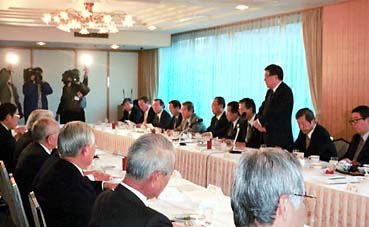|
On January 19, RENGO held a regular meeting with
NIKKEIREN at a hotel in Tokyo before full-scale discussions on
the 2001 Spring Struggle. President Washio, Deputy President
Enomoto, Secretary General Sasamori were among the members from
RENGO, Chairman Okuda, Director General Fukuoka and others from
NIKKEIREN also attended the meeting. Each side argued on pay
hike issues without reaching any agreement. Ultimately, both
sides decided to conduct joint research on the issue of work
sharing.
Photo:Pay hike talks at a standstill
(RENGO in background. Jan. 19)
 President Washio began the discussion by saying that "economic
conditions have improved at least over last year and corporate performance
has recovered." He asked for "RENGO's demand standard to be
frozen at last year's levels. We want you to understand and respond
to our will." NIKKEIREN Chairman Okuda however, gave a different
opinion saying, "as the economy has been facing a rather delicate
situation since last fall so we need to be cautious." President Washio began the discussion by saying that "economic
conditions have improved at least over last year and corporate performance
has recovered." He asked for "RENGO's demand standard to be
frozen at last year's levels. We want you to understand and respond
to our will." NIKKEIREN Chairman Okuda however, gave a different
opinion saying, "as the economy has been facing a rather delicate
situation since last fall so we need to be cautious."
Following that, Secretary General Sasamori explained RENGO's
arguments based primarily on the RENGO White Paper. In his explanation
Mr. Sasamori said, "RENGO will demand a 1% net pay raise
necessary for economic development after ensuring that the wage
curve will be maintained. RENGO has pushed shortening working
hours and extending employment as the unifying issues for discussions
on revising labor agreements. Further, we are also demanding
a pay increase of over¥10 in hourly wages for part-time workers.
Even though part-time workers are not union members we hope you
understand this."
After that, NIKKEIREN Director General Fukuoka explained the
"Labor Problem Inquiry Report" and the meeting proceeded
to an opinion exchange.
From RENGO, President Suzuki of DENKI RENGO (Japanese Electrical
Electronic & Information Union) stated "in order to
gain a common recognition, there is a need to arrange each side's
points of agreement and disagreement." ZENSEN (Japanese
Federation of Textile, Garment, Chemical, Mercantile, Food and
Allied Industries Workers' Unions) President Takagi stated, "there
should be no overtime-work without pay. It is crucial not to
destabilize rules."
JOHO ROREN (Japan Federation of Telecommunications, Electronic
Information and Allied Workers) President Tsuda said, "IT
propulsion as a panacea is in fact going unmentioned. We must
make a tough decision to secure sufficient employment."
DENRYOKU SOREN (Confederation of Electric Power Related Industry
Workers Union of Japan) President Tsumaki stated that "
we are making efforts to hire workers over 60 years of age,"
and SHOGYO ROREN (Japan Federation of Commercial Workers' Unions)
President Nagumo suggested that "we place importance on
minimum wage issues. We ought to strengthen our efforts to improve
work conditions for part-time laborers."
In addition, SHOKUHIN RENMEI (League of Japan Foods and Tobacco
Workers Union) President Masuda remarked that "[management]
should stop following the crowd with lower (pay raise) levels.
We expect companies that can afford to pay more and to do so."
KENSETSU RENGO (Japan Construction Trade Union Confederation)
President Terasawa called for "establishing labor-management
consultations by industry," and RENGO Vice President Morooka
added that we find it necessary to "support balancing work
and home free from male or female roles."
At that point, attendants from NIKKEIREN offered their opinions
and finally President Washio gave his remarks. He confirmed that
RENGO and NIKKEIREN would begin joint research on how to build
social consensus for a Japanese-type of work sharing program.
|
 President Washio began the discussion by saying that "economic
conditions have improved at least over last year and corporate performance
has recovered." He asked for "RENGO's demand standard to be
frozen at last year's levels. We want you to understand and respond
to our will." NIKKEIREN Chairman Okuda however, gave a different
opinion saying, "as the economy has been facing a rather delicate
situation since last fall so we need to be cautious."
President Washio began the discussion by saying that "economic
conditions have improved at least over last year and corporate performance
has recovered." He asked for "RENGO's demand standard to be
frozen at last year's levels. We want you to understand and respond
to our will." NIKKEIREN Chairman Okuda however, gave a different
opinion saying, "as the economy has been facing a rather delicate
situation since last fall so we need to be cautious."